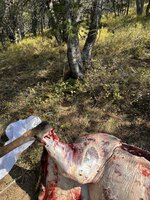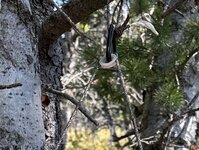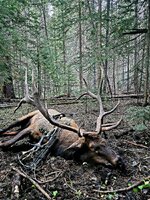Get out for a few over night solo trips in Texas before you commit to a trip. Work out your shelter system, your navigation, food etc all before you get out there.
There is truly nothing worse than getting gear and going out and being miserable and not be able to focus on while you are there.
Get your house in order, if there is anything stressing you out it just turns ten fold when you are alone with your thoughts and that sends people home more often than not.
For minimal gear and skills I would suggest the following- (coming from a solo hunter/ former SAR cadaver dog handler) You should always know how to have a basic understanding in the following
1. Navigation -
- Basic azimuth (back azimuth, bearing, azimuth, landscape / landmark navigation
- Knowing how to operate a GPS device. Lat / long, bread crumbing, waypoint navigation
- Know how to read topographical maps with elevation changes, drainages, roads, water ways etc and learn how to cross reference those maps with your compass, bearing and GPS device.
Things you need -a Decent compass (Silva, Suunto etc) a GPS device or app on your phone (Onx, Backcountry etc) I use an Inreach Mini, a Suunto compass and a Garmin Instinct watch and my phone has Onx. I will print out a topo map of the area and I typically use azimuth navigation for actual hunting more so than navigation (take a back azimuth and a front azimuth for navigational aids )
2. Water -
- Know how to locate water sources on a map and by natural features. Understand rain and water/creek flow directions because they will.... lead you to water.
- Have a working water filtration and storage system (I use Steripens and Befree system and Nalgenes)
- Know how to get water where you are at. I live on the wet side of the PNW so I its hard not to find water but when I lived in the Southwest I had to learn how to get ground water, how to treat still water and just really slow leaky water supplies.
I recommend having a main filtration system and a back up redundant system (tabs or boiling)
3. Shelter -
- Practice with your system before you go out on a trip. Your system should include whatever you are sleeping in - tent/ tarp/ vehicle, what you are sleeping on - inflatable pad/mat and your bag or quilt.
- Tents are easier to start with, tarps are "roughing it". I prefer floorless shelters but most people starting prefer tents. Seam seal every thing that is going to get wet (tarp, tent, rain fly)
- Learn how to properly pitch your tent/ set up. Avoid steep inclines, avoid water collection table spots, avoid places with standing dead trees because branches are much more likely to come off and hurt you.
4. Food -
- A balanced diet in every day life is essential so dont just pack up a bunch of freeze dried meals and think every thing is going to work like a well oiled machine.
- You can go hot meaning you bring a stove, gas and pot or you can go cold and you bring shelf stable foods that can be cold soaked or eaten room temp. I rarely bring cook kits on backpacking trips but I always bring them when Im car camping/ base camping.
5. Optics - Specialized tools -
- Your optics decisions need to be based around optimal performance for the area you are hunting.
Open country - you need 10x42 binos minimal but best practice is 10x42s or 10x50s and a spotting scope and tripod or 12x binos and a tripod.
Dense Timber, Coastal - Closed Country - I would say go with 6 or 8x binos and that is pretty much it.
Your cash flow will determine the level of optics you would need but I would say if you plan on going open country that is where you are going to be focusing more on higher quality in your budget. In timbered areas or dense areas anything over 10x is useless.
6. Fire - know how to and bring at least two ways of starting a fire.
- Lighter, Ferro Rod are usually the two best choices. Learn how properly build a fire safely and maintain a fire with minimal tools. You dont need to pack in axes and machetes to have camp/cooking fires.
7. Knives - Tools
- One fixed blade knife in my opinion 4 inches blade length or smaller is my choice. I dont baton wood or cut down trees when I am hunting so keep the knife to field dressing, food prep and small fire prep. I use an Esee Izula in S35vn but before that I primarily used and old Browning Hunting knife my dad gave me.
- A sharpener for said knife is a good idea - I prefer the Worksharp Field Sharpener for car camping/ base camping and just a small DMT 600 grit diamond stone for back packing.
- A back up multi tool or pocket knife is never a bad idea in case you lose or break the first one. I carry a Leatherman Signal on my belt and an Esee Izula in S35vn in my pack.
8. Clothing -
- Stick to Polyester, Nylon, Merino wool clothing, absolutely no cotton.
- I like merino wool underwear and socks/ baselayers in winter, nylon pants and poly blend shirts with merino or fleece hoodies and puffy vests.
- I typically do not buy camo patterns but I have a leafy jacket from North Mountain Gear that I throw over my top if I am not wearing camo base layers (I often just hunt in First Lite merino base layer piece I have) and that saves me a lot of money. I can wear solid colors in technical clothing that typically costs a fortune in camo patterns and still have camo.
- Boots should be worn and broken in. You typically have a choice between light-mid-heavy support boots. Go with what you like but consider the terrain.
- Gaiters are grrrrrrrrrrrrreat for wet and sloppy conditions. Dont go crazy on price though, they all get chewed up easily. I just buy camo ones on Amazon to be honest. They last two to three seasons.
9. Poop -
Yeah this gets an entire section devoted to just pooping. Freeze dried food, stress and all that hiking can cause stress on your bowels and if you do not frequently poop in the woods this can actually be a problem for new to the back country/campers. This is something that I bring up because its something that I overlooked when city dwellers or new to hunting / outdoors came out with me and they were shitting on their socks and pants or having near mental break downs worrying about how they are going to relieve themselves.
My basic kit - Back Country Bidet. Yeah, I pack it in. Yeah, its water being squirted up your bum. But its the cleanest you can be in the woods and it has become a beloved piece of kit . There are all kinds on the market but I suggest you getting a dedicated bottle kit not the screw in adapters you put on random water bottles.
I also bring a small package of wet wipes and a few squares of TP just in case for wipe up. But 99% of the fecal matter gets handled by the ole butt blaster.
And FFS dig a hole or at least cover it with a rock.
The best strategy to poop that I have found is drop your pants and underwear to just above your knees. Make sure there is clearance from your bung hole. Get as low as you can to the ground by squatting like an Iraqi in a shit box taking heavy fire. Hold on to something, get those knees up and clear from your boots. Let it rip and just hang there for a bit. Get the ole butt blaster out, squirt up there a few times. Grab a square of TP and do the oil check and if its clean you should be dry and pack the dirt over the hole you hopefully made and get back to hunting.
Out of all the conversations I have had with family and friends who hunt with me, its our shit talking that truly brings us together.




